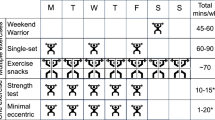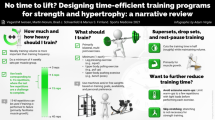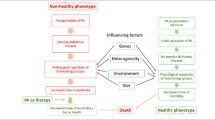Abstract
While exergames have been used with older adults in an attempt to promote higher physical activity (PA) levels, and its subsequent health benefits, there is a lack of research that objectively quantifies the PA levels that custom-made exergames can produce throughout an extended training program. In this paper, we describe a 3-month intervention study that aimed to measure the participants PA levels during exergames’ sessions and their effectiveness in eliciting the recommended activity levels. Over the course of the study, two groups of older adults participated in either a conventional multidimensional fitness training program of two sessions of exercise per week (n = 16) or in an equivalent combined program (n = 15), of one conventional and one exergame session per week. Both the objective PA levels (through accelerometry) and subjective effort (perceived exertion) were collected in each session. Results revealed that while participants spent more time in moderate-to-vigorous PA during exergaming than during conventional sessions, they also spent less energy, thus working out at lower intensities but for a more sustained amount of time. The self-reported exertion was consistently higher for the sessions of the combined exercise program. We showed that a set of custom-made exergames can be successfully used by trainers to set up personalized training sessions and can be used in combination with regular exercise for sustained long-term training, exposing differences between the two training regimes in terms of efficiency, elicited PA, and perceived effort.







Similar content being viewed by others
References
Larsen, L.H., Schou, L., Lund, H.H., Langberg, H.: The physical effect of exergames in healthy elderly—a systematic review. Games Health Res. Dev. Clin. Appl. 2, 205–212 (2013)
Skjæret, N., Nawaz, A., Morat, T., Schoene, D., Helbostad, J.L., Vereijken, B.: Exercise and rehabilitation delivered through exergames in older adults: an integrative review of technologies, safety and efficacy. Int. J. Med. Inform. 85, 1–16 (2016). https://doi.org/10.1016/j.ijmedinf.2015.10.008
DeSmet, A., Van Ryckeghem, D., Compernolle, S., Baranowski, T., Thompson, D., Crombez, G., Poels, K., Van Lippevelde, W., Bastiaensens, S., Van Cleemput, K., Vandebosch, H., De Bourdeaudhuij, I.: A meta-analysis of serious digital games for healthy lifestyle promotion. Prev. Med. 69, 95–107 (2014). https://doi.org/10.1016/j.ypmed.2014.08.026
Klompstra, L.V., Jaarsma, T., Strömberg, A.: Exergaming in older adults: a scoping review and implementation potential for patients with heart failure. Eur. J. Cardiovasc. Nurs. 13, 388–398 (2014). https://doi.org/10.1177/1474515113512203
Ravenek, K.E., Wolfe, D.L., Hitzig, S.L.: A scoping review of video gaming in rehabilitation. Disabil. Rehabil. Assist. Technol. (2015). https://doi.org/10.3109/17483107.2015.1029538
Keefe, F.J., Huling, D.A., Coggins, M.J., Keefe, D.F., Zachary Rosenthal, M., Herr, N.R., Hoffman, H.G.: Virtual reality for persistent pain: a new direction for behavioral pain management. PAIN 153, 2163–2166 (2012). https://doi.org/10.1016/j.pain.2012.05.030
Chao, Y.-Y., Scherer, Y.K., Montgomery, C.A.: Effects of using Nintendo Wii™ exergames in older adults: a review of the literature. J. Aging Health 27, 379–402 (2015)
Peng, W., Lin, J.-H., Crouse, J.: Is playing exergames really exercising? A meta-analysis of energy expenditure in active video games. Cyberpsychol. Behav. Soc. Netw. 14, 681–688 (2011)
Velazquez, A., Martínez-García, A.I., Favela, J., Ochoa, S.F.: Adaptive exergames to support active aging: an action research study. Pervasive Mob. Comput. 34, 60–78 (2017)
Bushman, B., American College of Sports Medicine (ACSM): ACSM’s Complete Guide to Fitness & Health, 2nd edn. Human Kinetics, Champaign (2017)
Chodzko-Zajko, W.J., Proctor, D.N., Singh, M.A.F., Minson, C.T., Nigg, C.R., Salem, G.J., Skinner, J.S.: Exercise and physical activity for older adults. Med. Sci. Sports Exerc. 41, 1510–1530 (2009)
Sween, J., Wallington, S.F., Sheppard, V., Taylor, T., Llanos, A.A., Adams-Campbell, L.L.: The role of exergaming in improving physical activity: a review. J. Phys. Act. Health 11, 864 (2014)
O’Leary, K.C., Pontifex, M.B., Scudder, M.R., Brown, M.L., Hillman, C.H.: The effects of single bouts of aerobic exercise, exergaming, and videogame play on cognitive control. Clin. Neurophysiol. 122, 1518–1525 (2011)
Bronner, S., Pinsker, R., Naik, R., Noah, J.A.: Physiological and psychophysiological responses to an exer-game training protocol. J. Sci. Med. Sport 19(3), 267–271 (2015)
Skjaeret, N., Nawaz, A., Morat, T., Schoene, D., Helbostad, J.L., Vereijken, B.: Exercise and rehabilitation delivered through exergames in older adults: an integrative review of technologies safety and efficacy. Int. J. Med. Inform. 85, 1–16 (2016)
Taylor, L.M., Maddison, R., Pfaeffli, L.A., Rawstorn, J.C., Gant, N., Kerse, N.M.: Activity and energy expenditure in older people playing active video games. Arch. Phys. Med. Rehabil. 93, 2281–2286 (2012)
Muñoz, J. E., Bermudez, S., Rubio, E., Cameirao, M.: Modulation of physiological responses and activity levels during exergame experiences. In: 2016 18th International Conference on Virtual Worlds and Games for Serious Applications. IEEE (2016) (in press)
Graves, L.E., Ridgers, N.D., Williams, K., Stratton, G., Atkinson, G.T.: The physiological cost and enjoyment of Wii Fit in adolescents, young adults, and older adults. J. Phys. Act. Health 7, 393–401 (2010)
Kappen, D., Mirza-Babaei, P., Nacke, L.: Gamification of older adults’ physical activity: an eight-week study. In: Proceedings of the 51st Hawaii International Conference on System Sciences (2018)
Guderian, B., Borreson, L.A., Sletten, L.E., Cable, K., Stecker, T.P., Probst, M.A., Dalleck, L.C.: The cardiovascular and metabolic responses to Wii Fit video game playing in middle-aged and older adults. J. Sports Med. Phys. Fitness 50, 436–442 (2010)
Maillot, P., Perrot, A., Hartley, A.: Effects of interactive physical-activity video-game training on physical and cognitive function in older adults. Psychol. Aging 27, 589–600 (2012). https://doi.org/10.1037/a0026268
Chuang, T.-Y., Sung, W.-H., Chang, H.-A., Wang, R.-Y.: Effect of a virtual reality–enhanced exercise protocol after coronary artery bypass grafting. Phys. Ther. 86, 1369–1377 (2006)
Uzor, S., Baillie, L.: Investigating the long-term use of exergames in the home with elderly fallers. In: Proceedings of the 32Nd Annual ACM Conference on Human Factors in Computing Systems, pp. 2813–2822. ACM, New York (2014). https://doi.org/10.1145/2556288.2557160
Konstantinidis, E.I., Billis, A.S., Mouzakidis, C.A., Zilidou, V.I., Antoniou, P.E., Bamidis, P.D.: Design, implementation, and wide pilot deployment of FitForAll: an easy to use exergaming platform improving physical fitness and life quality of senior citizens. IEEE J. Biomed. Health Inform. 20, 189–200 (2016)
Wu, Y.-Z., Lin, J.-Y., Wu, P.-L., Kuo, Y.-F.: Effects of a hybrid intervention combining exergaming and physical therapy among older adults in a long-term care facility. Geriatr. Gerontol. Int. 19(2), 147–152 (2018)
Taylor, L., Kerse, N., Klenk, J., Borotkanics, R., Maddison, R.: Exergames to improve the mobility of long-term care residents: a cluster randomized controlled trial. Games Health J. 7, 37–42 (2018)
Lee, S., Myers, N.D., Park, T., Hill, C.R., Feltz, D.L.: An exploratory study on the Köhler effect and flow in long-term exergaming. Simul. Gaming 49(5), 538–552 (2018). https://doi.org/10.1177/1046878118776043
Oesch, P., Kool, J., Fernandez-Luque, L., Brox, E., Evertsen, G., Civit, A., Hilfiker, R., Bachmann, S.: Exergames versus self-regulated exercises with instruction leaflets to improve adherence during geriatric rehabilitation: a randomized controlled trial. BMC Geriatr. 17, 77 (2017)
Sinclair, J., Hingston, P., Masek, M.: Exergame development using the dual flow model. In: Proceedings of the Sixth Australasian Conference on Interactive Entertainment, p. 11. ACM (2009)
Muñoz, J., Gonçalves, A.R., Gouveia, E.R., Cameirao, M.S., Bermúdez i Badia, S.: Measured and perceived physical responses in multidimensional fitness training through exergames in older adults. Presented at the 10th International Conference on Virtual Worlds and Games for Serious Applications, Würzburg, Germany (2018)
Folstein, M.F., Folstein, S.E., McHugh, P.R.: “Mini-mental state”: a practical method for grading the cognitive state of patients for the clinician. J. Psychiatr. Res. 12, 189–198 (1975). https://doi.org/10.1016/0022-3956(75)90026-6
Rikli, R.E., Jones, C.J.: Senior fitness test manual. Human Kinetics, Champaign (2013)
Simão, H., Bernardino, A.: User centered design of an augmented reality gaming platform for active aging in elderly institutions. In: icSPORTS (2017). https://doi.org/10.5220/0006606601510162
Gonçalves, A., Muñoz, J., Gouveia, E., Cameirão, M.S., Badia, S.B. i: Portuguese tradition inspired exergames for older people—strategic tools to promote functional fitness. In: icSports 2017 (2017)
Chu, A.H., Ng, S.H., Paknezhad, M., Gauterin, A., Koh, D., Brown, M.S., Müller-Riemenschneider, F.: Comparison of wrist-worn Fitbit Flex and waist-worn ActiGraph for measuring steps in free-living adults. PLoS ONE 12, e0172535 (2017)
Heyward, V.H., Gibson, A.: Advanced fitness assessment and exercise prescription, 7th edn. Human Kinetics, Champaign (2014)
Jones, C.J., Rose, D.J.: Physical activity instruction of older adults. Human Kinetics, Champaign (2005)
Höchsmann, C., Schüpbach, M., Schmidt-Trucksäss, A.: Effects of exergaming on physical activity in overweight individuals. Sports Med. 46, 845–860 (2016)
Chaput, J.P., Leduc, G., Boyer, C., Belanger, P., LeBlanc, A.G., Borghese, M.M., Tremblay, M.S.: Objectively measured physical activity, sedentary time and sleep duration: independent and combined associations with adiposity in Canadian children. Nutr. Diabetes 4, e117 (2014)
Aguilar-Farías, N., Brown, W.J., Peeters, G.G.: ActiGraph GT3X + cut-points for identifying sedentary behaviour in older adults in free-living environments. J. Sci. Med. Sport 17, 293–299 (2014)
Copeland, J.L., Esliger, D.W.: Accelerometer assessment of physical activity in active, healthy older adults. J. Aging Phys. Act. 17, 17–30 (2009)
Barnett, A., van den Hoek, D., Barnett, D., Cerin, E.: Measuring moderate-intensity walking in older adults using the ActiGraph accelerometer. BMC Geriatr. 16, 211 (2016)
Acknowledgements
Authors would like to thank the staff personnel of “Ginásio de Santo António- Funchal” for the valuable collaboration during the experiment and all the volunteers for the commitment to the training session. Authors would like to thank the sports science professionals Honorato Sousa and Lúcia Conceição who conducted the training and carried out the assessments.
Funding
The work was funded by the Portuguese Foundation for Science and Technology through the Augmented Human Assistance project (CMUP-ERI/HCI/0046/2013), Projeto Estratégico UID/EEA/50009/2019, MACBIOIDI (INTERREG program MAC/1.1.b/098), and ARDITI (Agência Regional para o Desenvolvimento da Investigação, Tecnologia e Inovação).
Author information
Authors and Affiliations
Corresponding author
Ethics declarations
Conflict of interest
The authors declare that they have no conflict of interest.
Ethical standards
This work was confirmed to comply with the national and international guidelines for scientific research with humans by the ethical council of the Faculty of Human Motricity, University of Lisbon (Review 14/2017).
Informed consent
All the participants gave informed written consent.
Additional information
Publisher's Note
Springer Nature remains neutral with regard to jurisdictional claims in published maps and institutional affiliations.
Electronic supplementary material
Below is the link to the electronic supplementary material.
Supplementary material 1 (MP4 92676 kb)
Rights and permissions
About this article
Cite this article
Gonçalves, A.R., Muñoz, J.E., Gouveia, É.R. et al. Effects of prolonged multidimensional fitness training with exergames on the physical exertion levels of older adults. Vis Comput 37, 19–30 (2021). https://doi.org/10.1007/s00371-019-01736-0
Published:
Issue Date:
DOI: https://doi.org/10.1007/s00371-019-01736-0




